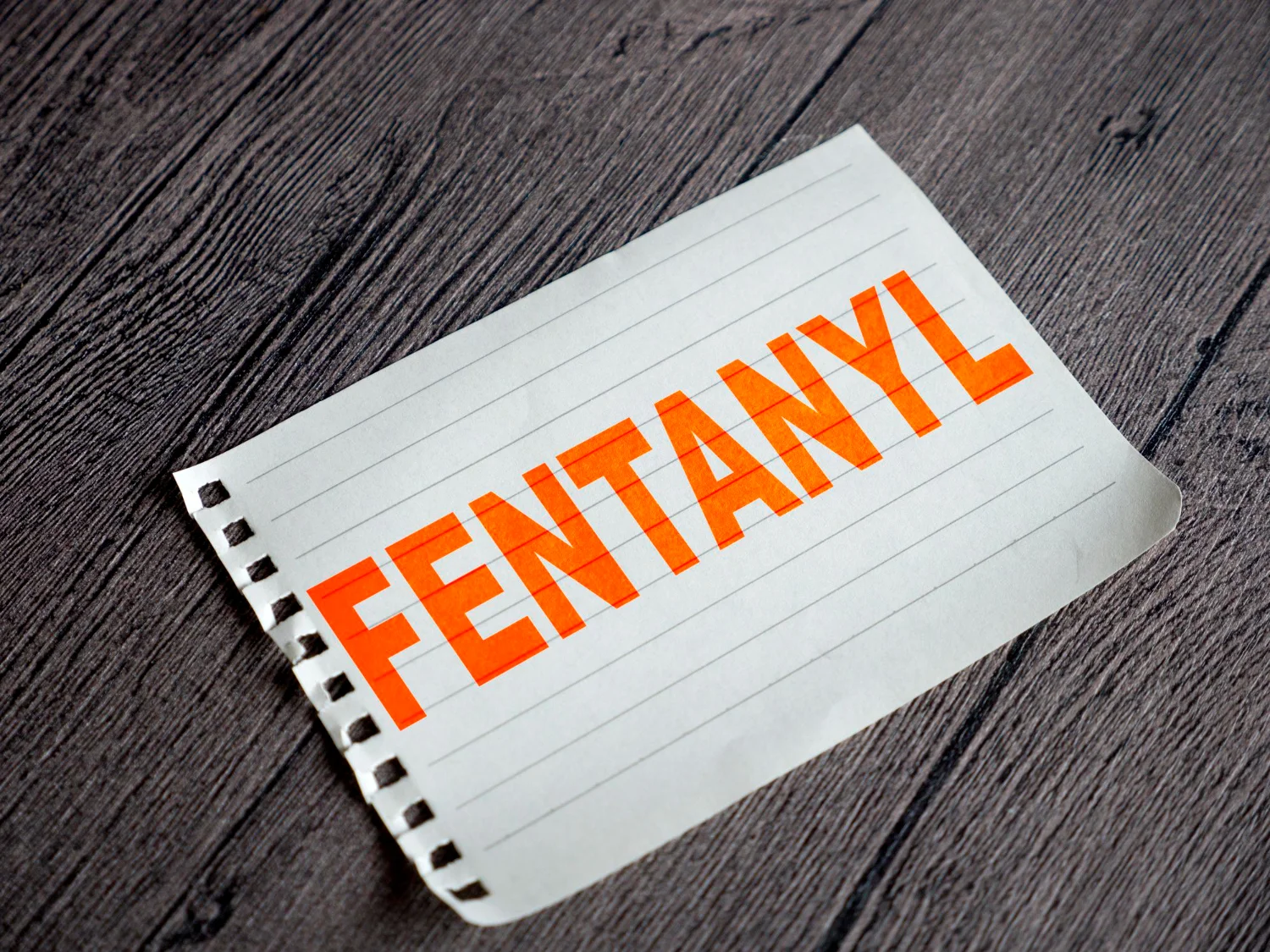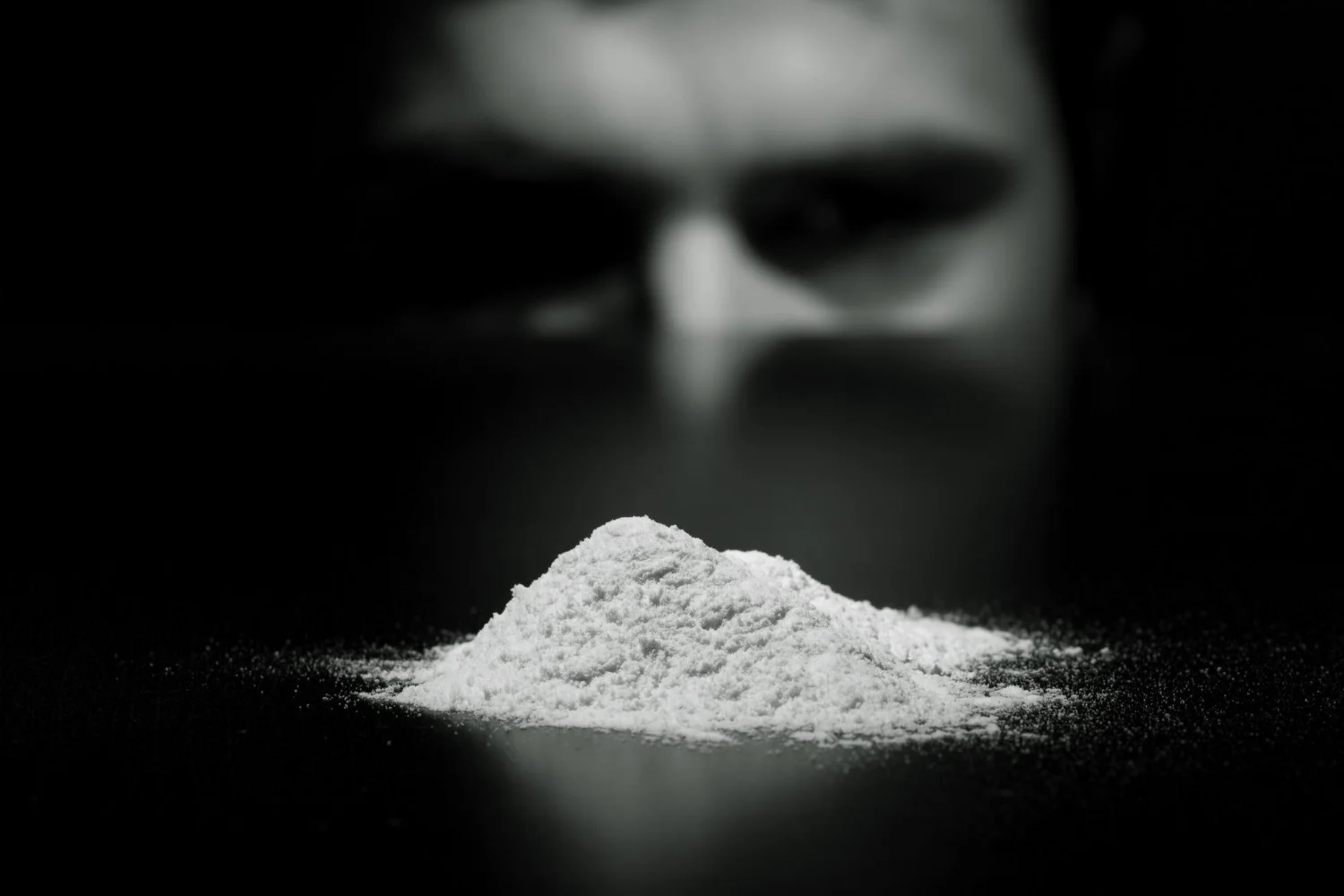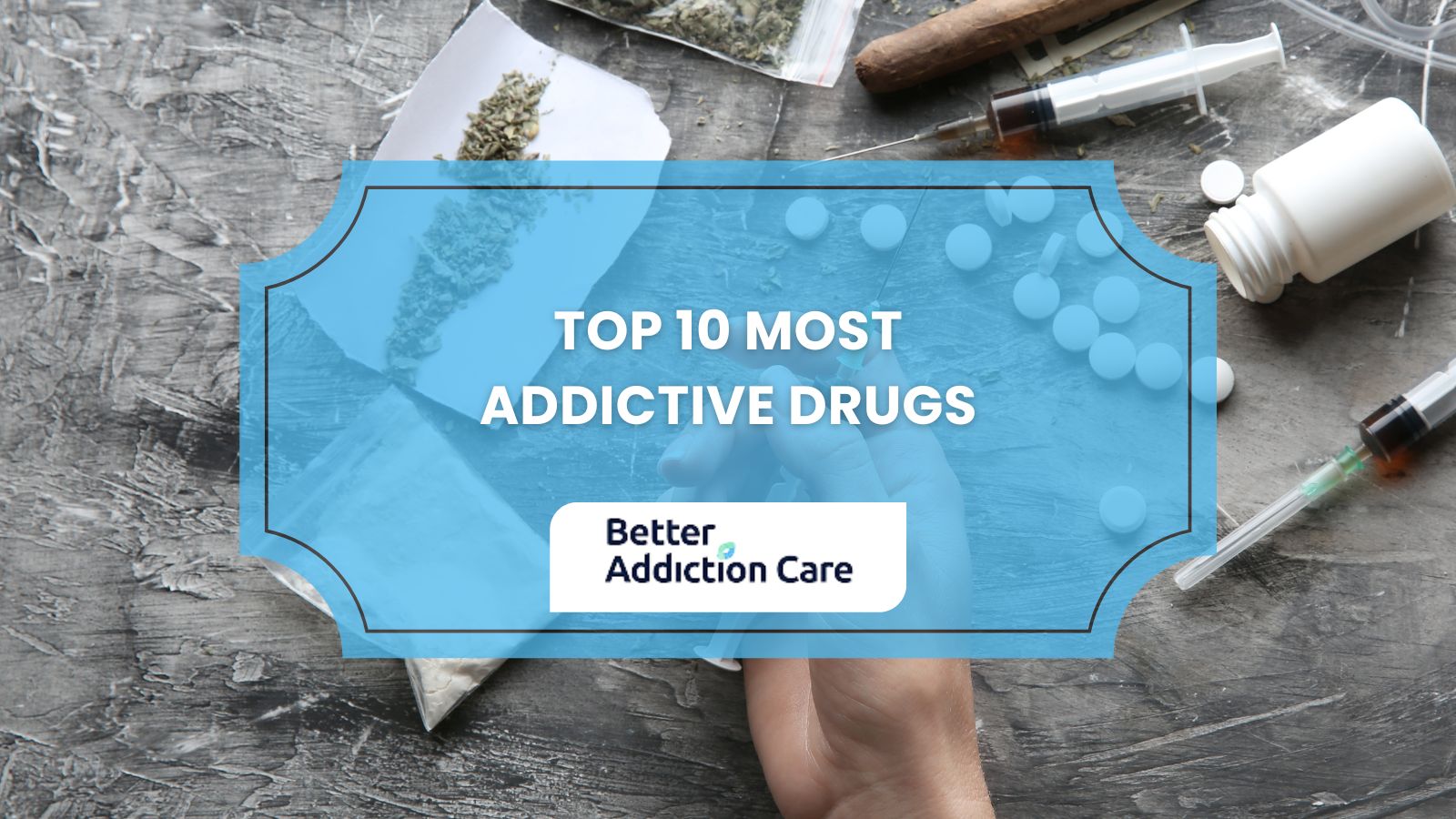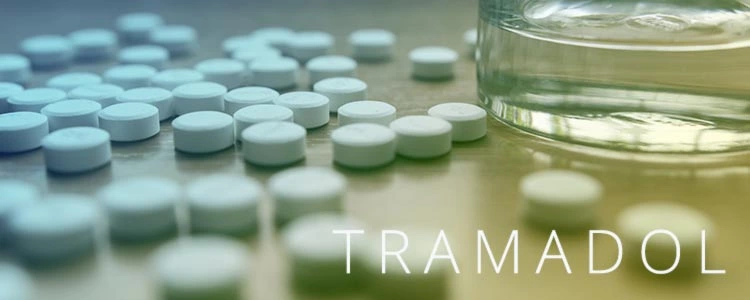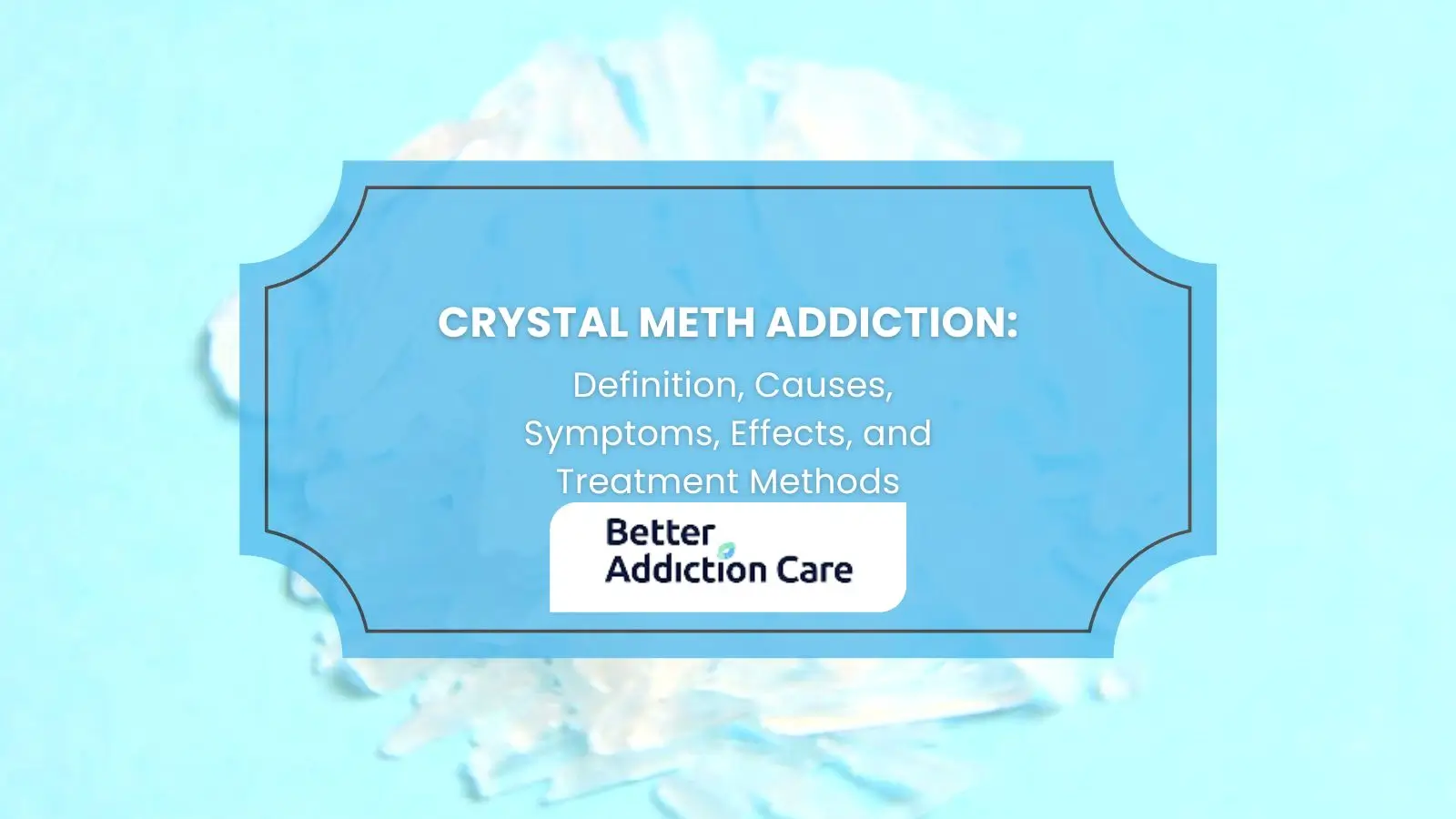Methadone Addiction: Definition, Symptoms, Causes, Health Risks, and Treatment
In 2017, 3.2 million Americans aged 12 and older struggled with methadone addiction, and 3,000 lives were lost to overdose, as per the National Center for Health Statistics (NCHS). Methadone is meant to help with opioid recovery, but without proper supervision, it leads to addiction. This kind of dependence affects both the body and mind, making everyday life feel overwhelming. If you're facing this, you're not alone—help is possible, and recovery is within reach.
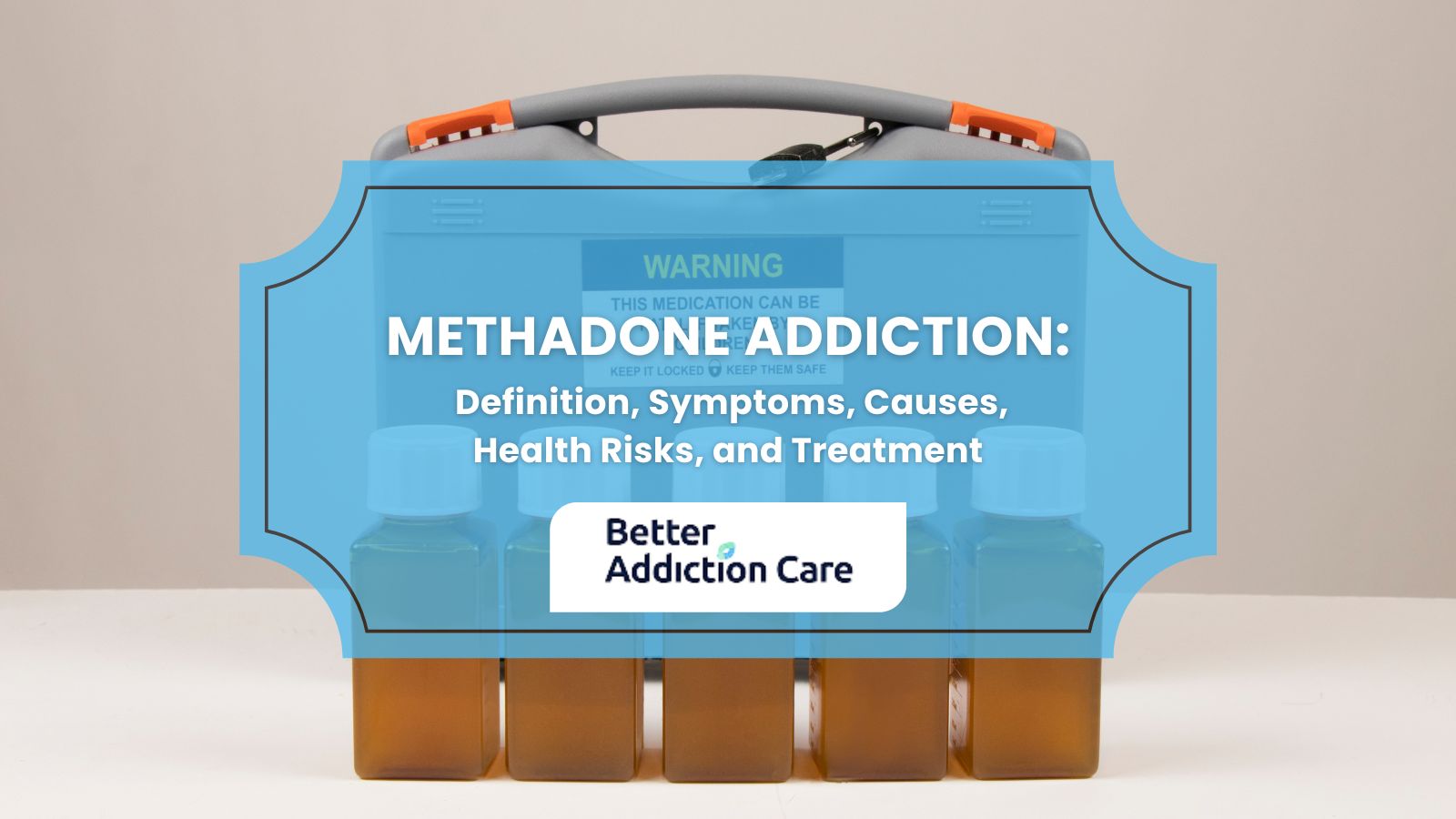
The common signs and symptoms of methadone addiction are drowsiness, respiratory problems, gastrointestinal issues, doctor shopping, isolation, continuous cravings, unsuccessful attempts to quit the drug, and mental health disorders.
The causes of methadone addiction include prolonged use, misuse of the drug, genetic factors, psychological factors, and environmental influences.
The health risks of methadone addiction include liver damage, overdose risk, heart issues, hormonal imbalance, and co-occurring mental health disorders.
The treatment options for methadone addiction include medical detoxification, medication-assisted treatment (MAT), counseling and therapies, support groups, and rehabilitation programs.
What is Methadone Addiction?
Methadone addiction is defined as the compulsive intake of methadone without prescription despite its negative effects. Methadone has the potential to be addictive but it is not illegal like other opioids, as per a study titled “Clinical Guidelines for Withdrawal Management and Treatment of Drug Dependence in Closed Settings” by WHO.
In the DSM-5, methadone addiction is a type of opioid use disorder that is characterized by the presence of at least 2 addiction symptoms for over a year. Methadone is prescribed as a medication-assisted treatment (MAT) for pain and withdrawal relief conditions. The development of its tolerance leads to addiction. The level of addiction varies based on the tolerance and intake levels.
What Are The Signs and Symptoms of Methadone Addiction?
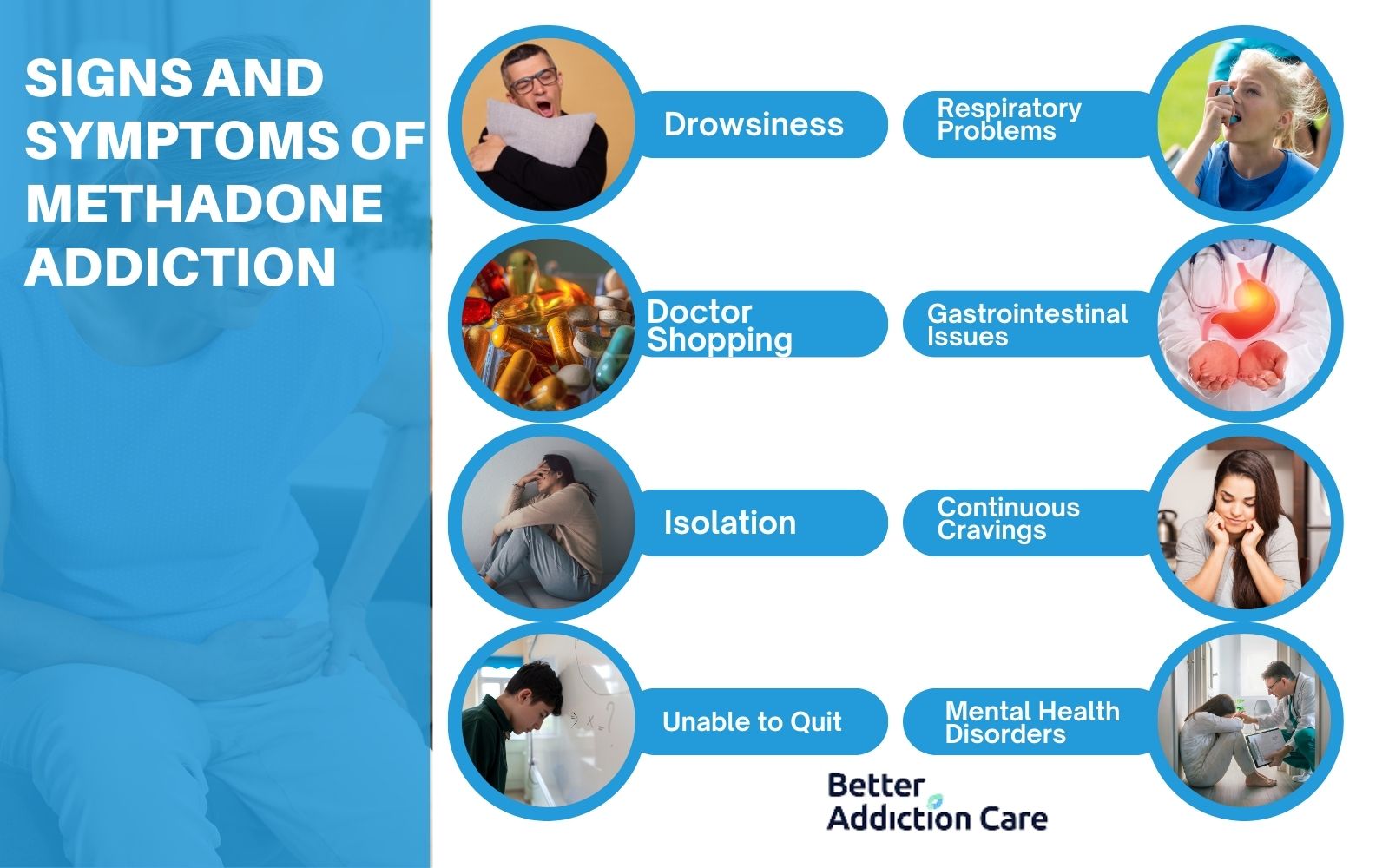
The common signs and symptoms of methadone addiction are drowsiness, respiratory problems, gastrointestinal issues, doctor shopping, isolation, continuous cravings, unsuccessful attempts to quit the drug, and mental health disorders.
The signs and symptoms of methadone addiction are listed below:
-
Drowsiness: Methadone affects brain chemistry, causing extreme fatigue and disrupted sleep, leading to drowsiness and insomnia during withdrawal.
-
Respiratory Problems: High methadone intake slows breathing and lowers blood pressure, leading to respiratory issues.
-
Gastrointestinal Issues: Methadone impacts the digestive system, causing constipation, nausea, and bloating.
-
Doctor Shopping: Individuals addicted to methadone visit multiple doctors to get extra prescriptions when one isn't enough.
-
Isolation: People addicted to methadone withdraw from social life, avoid interactions, and lose interest in daily activities.
-
Continuous Cravings: Methadone use triggers strong, ongoing cravings and withdrawal symptoms, even during treatment.
-
Unsuccessful Attempts to Quit: Repeated failed efforts to stop using methadone signal growing dependence.
-
Mental Health Disorders: Methadone addiction is linked to mental health issues like depression and personality disorders.
What Are The Causes of Methadone Addiction?
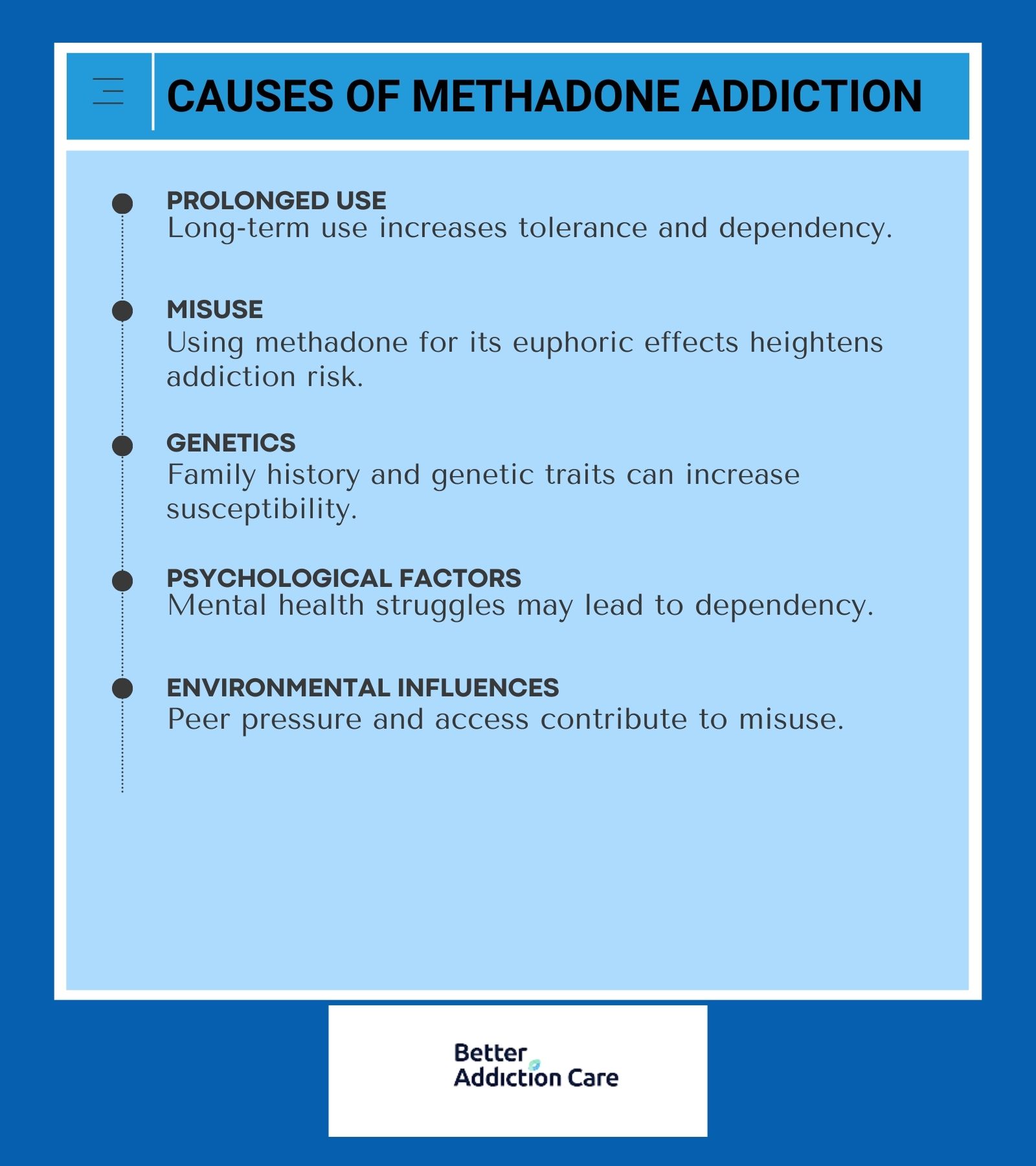
The 5 causes of methadone addiction include prolonged use, misuse of the drug, genetic factors, psychological factors, and environmental influences.
Here are the key causes of methadone addiction:
-
Prolonged Use: Methadone is prescribed for pain or OUD, but using it beyond medical guidance builds tolerance and weakens its effect. Increased tolerance drives the need for higher doses, which leads to addiction.
-
Misuse of the Drug: Methadone’s euphoric effect makes it easy to abuse. Misusing it beyond medical need causes addiction and harms the heart, liver, and lungs. Overuse raises the risk of overdose and death.
-
Genetic Factors: People with a family history of methadone addiction are more likely to develop it. Genetics influence how the body processes methadone and how strongly the brain responds to its effects.
-
Psychological Factors: Anxiety, stress, and depression drive some to rely on methadone for relief. This emotional dependence leads to repeated use, making addiction more likely.
-
Environmental Influences: Easy access, peer pressure, and drug-using environments increase the risk of methadone misuse, even when prescribed.
What Are The Health Risks of Methadone Addiction?
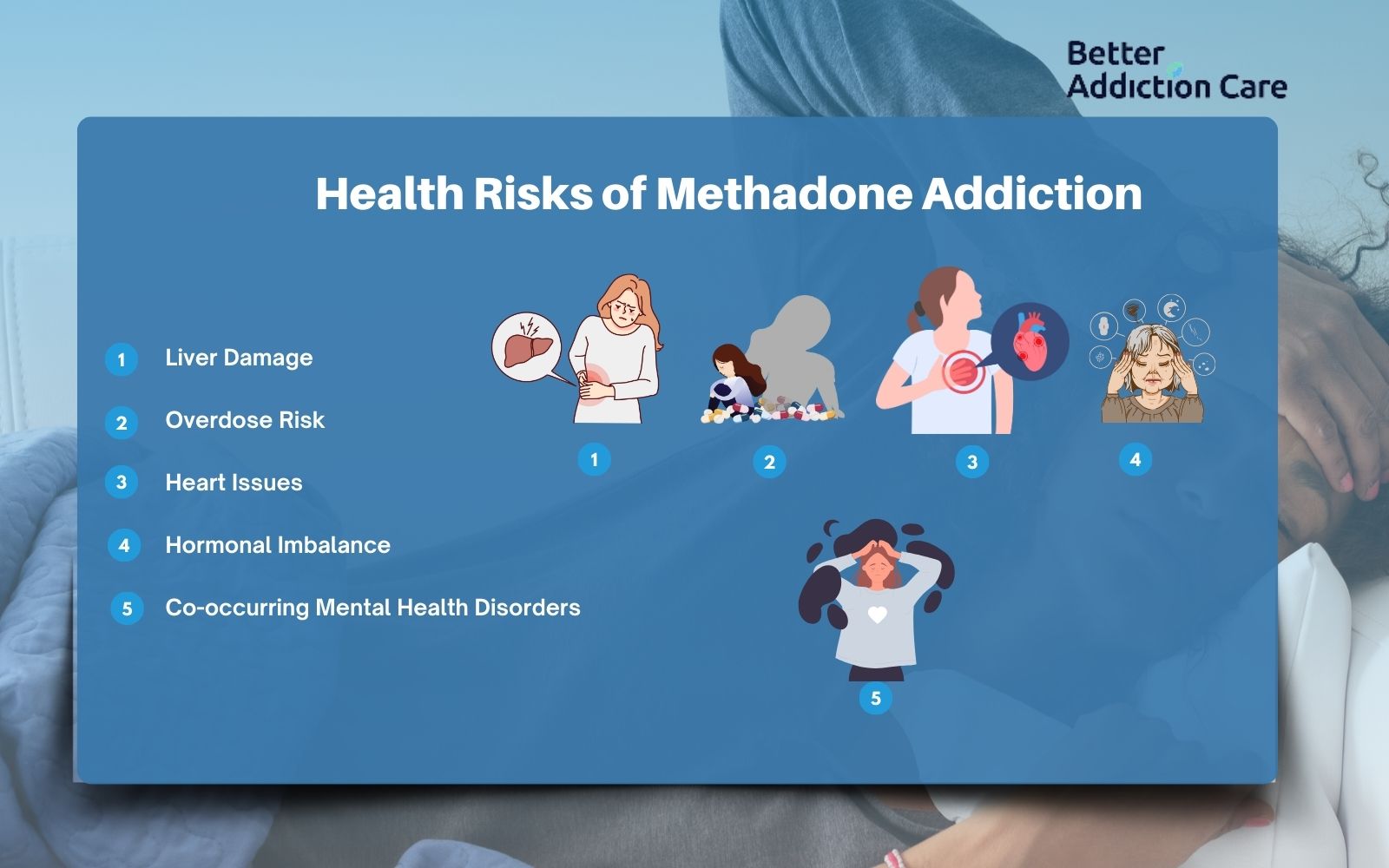
The health risks of methadone addiction include respiratory risks, overdose risk, heart issues, hormonal imbalance, and co-occurring mental health disorders.
-
Respiratory Risks: Methadone causes respiratory depression, especially during treatment initiation or dose increases. According to Benítez-Rosario, M. A.’s 2006 study, ‘Methadone-induced respiratory depression after discontinuing carbamazepine administration, ’ the patient was on 210mg/day methadone when she developed respiratory depression, but only required 75mg/day (one-third the dose) for adequate pain control after the episode.
-
Overdose Risk: The excessive use of methadone has the potential for overdose leading to death. The overdose is either intentional or accidental, according to a study titled “Keeping Patients Safe From Methadone Overdoses” by Matthew Grissinger. The compulsive usage leads to a continuous need for more methadone intake. Excessive intake beyond tolerance levels is intoxicating and results in overdose.
-
Heart Issues: Methadone misuse increases the risk of irregular heart rhythms, leading to fainting, seizures, or sudden cardiac arrest. It weakens the heart over time and raises the chance of fatal complications. According to Taheri, S.K.’s 2023 study, ‘One-year survey of methadone-induced cardiac complications’, methadone poisoning cases found that sinus tachycardia (20%) and QT interval prolongation (6.64%) were the most common cardiac complications observed.
-
Hormonal Imbalance: Methadone affects hormone regulation by disrupting the adrenal glands, causing hormonal imbalances like adrenal insufficiency and reduced hormone production.
-
Co-occurring Mental Health Disorders: Methadone addiction leads to the risk of mental health disorders like anxiety, depression, and borderline personality disorder. The addiction is known to cause cognitive impairment. People suffering from anxiety-related disorders use methadone as self-medication for relief. The uncontrollable usage results in methadone addiction.
What Are The Effects of Methadone Addiction on Life?
The effects of methadone addiction on life include serious health problems like cognitive impairment, heart issues, and respiratory problems. Prolonged usage makes it difficult for the body to recover from illness. Cognitive impairment causes a loss of focus and productivity, which leads to poor performance at work. Methadone addiction also leads to social withdrawal and regular conflicts with people, which poorly affect personal relationships. Job loss leads to further financial and mental strain, resulting in additional health complications. Financial strain makes it difficult to obtain further methadone dosage, which complicates withdrawal and treatment.
What Are The Treatment Options For Methadone Addiction?
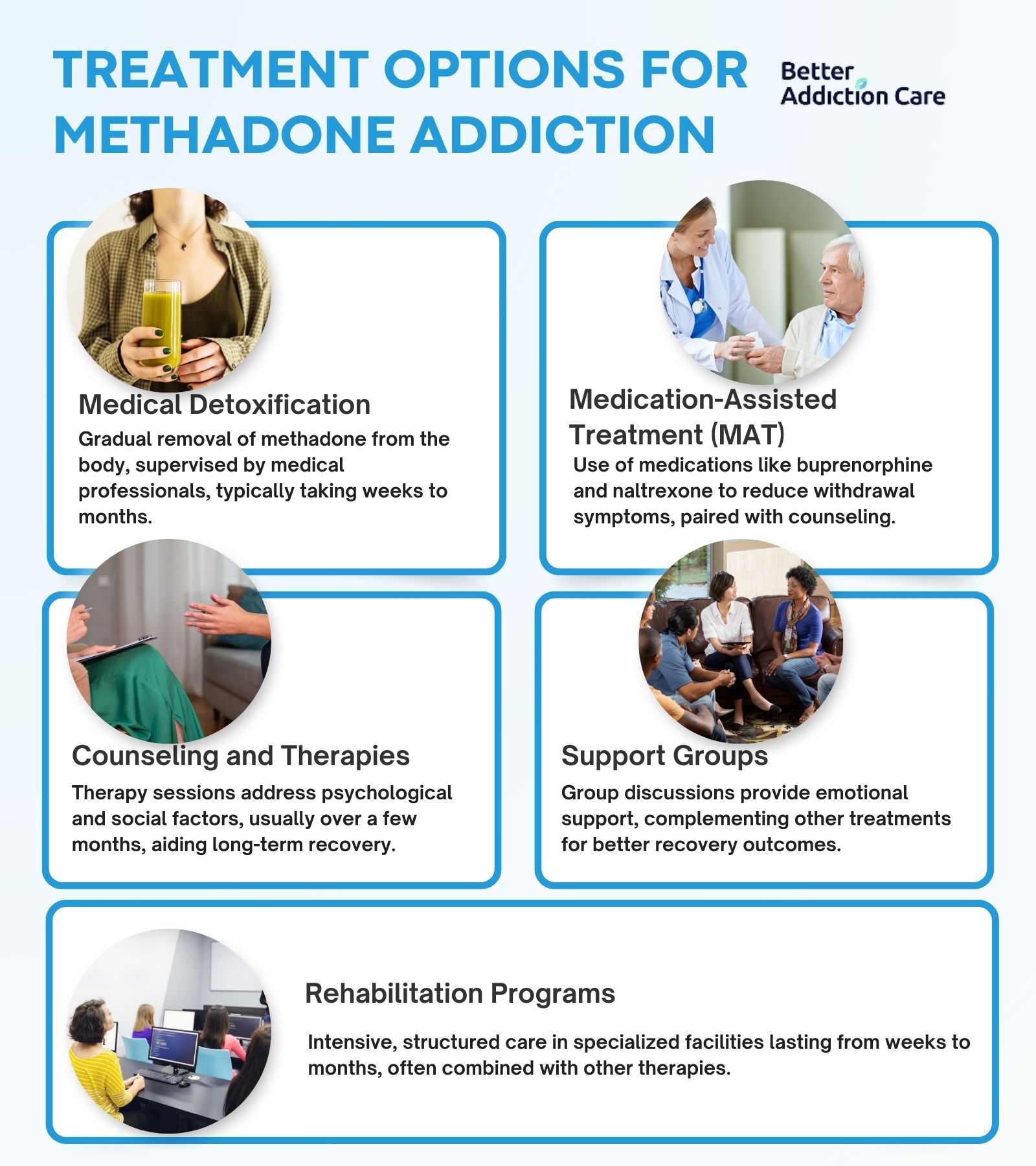
The treatment options for methadone addiction include medical detoxification, medication-assisted treatment (MAT), counseling and therapies, support groups, and rehabilitation programs.
The treatment options for methadone addiction are listed below:
-
Medical Detoxification: Medical detox removes methadone toxins from the body under expert supervision. It is the first step in treatment and takes weeks or months based on addiction severity.
-
Medication-Assisted Treatment (MAT): MAT combines medicines like buprenorphine or naltrexone with counseling to ease withdrawal and cravings. Results begin in 4 to 5 weeks, and treatment requires a prescription.
-
Counseling and Therapies: Therapy addresses the emotional and psychological roots of addiction. Regular sessions help stabilize behavior and typically show progress within 3 to 4 months.
-
Support Groups: Support groups bring people with similar struggles together to share and heal. While not a standalone treatment, they boost recovery when paired with therapy or medication.
-
Rehabilitation programs: Rehab programs include physical, emotional, and mental care, either inpatient or outpatient. These programs last 4 weeks to 2 months and work best with detox and medication.
How is Methadone Addiction Different From Other Opioid Use Disorders?
Methadone addiction differs from other opioid addictions based on its usage, as it is used for medicinal purposes primarily. However, many other opioid use disorders, like heroin and fentanyl addiction, are a result of recreational drug intake. Methadone is addictive like other opioids, but its intake is rather safe in contrast to other illegal opioids. Methadone intake under a medical expert’s supervision is considered safer.
Are Heroin And Methadone Classified As Opioids?
Yes, heroin and methadone are classified as opioids. Methadone is a medicinal drug used to treat chronic pain and opioid addiction. Heroin is a recreational drug that creates euphoric effects and has no medical benefits, but it has a high risk of severe heroin addiction. Both of these drugs are considered a form of opioid. However, methadone is used for medicinal purposes, and heroin is used for euphoria.
Do Methadone And Codeine Have The Potential For Physical Dependence?
Yes, methadone and codeine have the potential for physical dependence. Codeine is a low-potency opioid drug used to treat mild pain and cough issues. Methadone is a medicinal drug used for the treatment of chronic pain and opioid addiction. Methadone and codeine are used for medical purposes, but their potency varies. Both methadone and codeine addiction lead to physical dependency.
How Can I Find Drug Rehab Facilities For Methadone Addiction Treatment?
To find drug rehab facilities for methadone addiction treatment, look for both inpatient and outpatient options. Inpatient facilities include medical detox centers with 24/7 supervision, residential treatment centers offering comprehensive 30-90 day programs, and specialized Opioid Treatment Programs (OTPs). Outpatient alternatives consist of Intensive Outpatient Programs (IOPs), standard outpatient counseling, and Medication-Assisted Treatment (MAT) centers that utilize evidence-based approaches with medications like buprenorphine or naltrexone.
The most effective methadone addiction treatment combines evidence-based medical detox, proven behavioral therapy, and comprehensive long-term support through specialized facilities that address both the physical and psychological aspects of opioid dependency. Break free from methadone addiction today with qualified treatment centers specializing in methadone addiction recovery in California, Texas, New York, Florida, and other areas nationwide, taking the first step toward lasting recovery.
Related Articles
Treatment Centers in New Jersey




